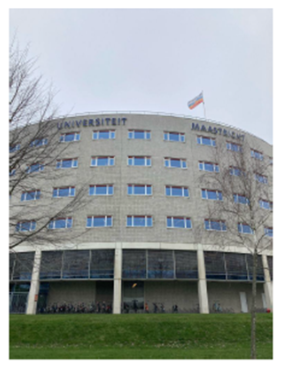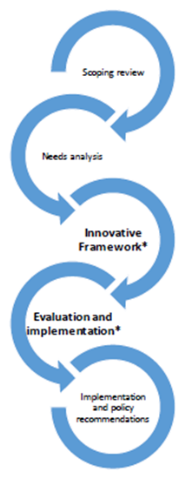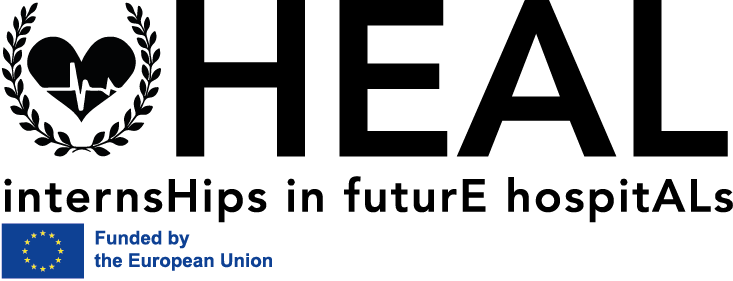Newsletter HEAL Vol. 3
The third partner meeting
We are in the pilot testing phase!
 From March 1 - 3, 2023, the hird partner meeting of the HEAL Project was held in Maastricht at Maastricht University. The objective of the partner meeting was for the partners to present and discuss the first draft of the prototype of the innovative framework. At the meeting, we decided a plan on how the learners and teachers can give input to the innovative framework in each country. It is with great excitement that we can share some of the overall plans for the pilot tests in this newsletter.
From March 1 - 3, 2023, the hird partner meeting of the HEAL Project was held in Maastricht at Maastricht University. The objective of the partner meeting was for the partners to present and discuss the first draft of the prototype of the innovative framework. At the meeting, we decided a plan on how the learners and teachers can give input to the innovative framework in each country. It is with great excitement that we can share some of the overall plans for the pilot tests in this newsletter.
The six partners have decided upon the following plans for the pilot testing phase:
- Odense University Hospital (Denmark)
The purpose of the pilot proejct for nursing students is to make the students is to make the students more active in their own learning and development. The students must be more aware of their mindset towards learning. We try to make progrression visible in the clinical education. We have developed three templates for the students to work with, these focus areas in cooperation with their clinical teacher.
1. - Before the students start their internship, they must take a learning style test, and choose 2-3 learning goals that they want to work with in depth. This must be coordinated with the clinical teacher.
2. - During their internship, the students must focus on bettering their reflection skills, via tools we created.
3. - The students must evaluate with their clinical teacher, if they succeeded in working with their chosen goals, and what they need to focus on in future internships. - University of Southern Denmark (Denmark)
SDU and OUH are working on two sub-prjects with medical students:
1. - Building an ePortfolio for medical students in the clinic that are built in SDU's electronical system learning platform. - ItsLearning. Current and future teams of medical students co-create a learning portfolio about their learning goals.
2. Introduction and development of inter professional learning conferences with medical- and nursing students. The purpose is to develop a common understanding of the interrdisciplinary aspect of and perspectives on fundamental processes in the patient's course at the hospital. The process is also to integrate the different professionalities point of view and promote 'reflection-on-learning' among the education seekers in order to identify ptoential learning areas, for the benefit of the education seekers' cooperation skills and for the integrated patient course. - Trinity College Dublin (Ireland)
The topic of the pilot is Enabling learning: to meet a need to reduce overcrowding is specialized placement. Using problem based learning; the pilot will be implemented via online learning simulation activities.
The pilot project will be assessed using debriefing/reflection and peer review. - Maastricht University (The Netherlands)
Maastricht University is planning to pilot two interventions as part of a larger curriculum change for clinical rotations for medical students. One of the aims of that curriculum change is to increase the education focus on prevention and extra-mural care. In that context, we are preparing:
1. - an educational activity as part of the clinical rotations in medicine and surgery, that requires students to perform a home-visit to patients they have seen in the ward a few days or weeks after being discharged from the hospital.
2. - a new elective rotation on 'Prevention, Health and Society' with intended learning outcomes related to public and population health, inter professional collaboration, health policy and diversity. - Haute Ecole Libre Mosane University College (Belgium)
HELMO wants to delvelop different skills for nursing students: clinical judgement, involvement in their personal training, peer-to-peer delegations and leadership. The students will be seen three times by their teacher, in the hospital, where they will work on the personal aims of the internship; possibility for the teacher to see several students at the same time. The student and teacher can work with a clinical case and the teacher will assess the students learning with the chief nurse. Finally, the students and teacher can review the personal aims of the internship and writing new aims for the future. - German Trias I Pujol Research Institute (Catalonia)
The topic for the pilot is - study on the implementation of hifh simulation for the acquisition of decision-making skills in the basic assessment of hospitalized patients in nursing and medical students.
The activities in the pilot testing phase include - clinical case with high simulation in directed ectivity "Basic assessment of the hospitalized patient". Decision-making and evaluation of the clinical case by means of gamification. Teamwork with decisions-making and evaluation of the clinical case. Repetition of the case and improve the score obtainted through gamification. Individidual work and study of the bibliographical references and tools provided by the clinical case.
The Project Plan
The HEAL Project consists of the 5 intellectual outputs shown in the figure.
Odense University Hospital are lead on the innovative framework (IF). The innovative framework is the body of the project, and it is through the innovative framework that the end result of the HEAL Project - a toolbox, will be developed. There will be three testing rounds, the partners will evaluate with the learners and teachers to further develop the IF.
Maastricht University are lead on evaluation and implementation. The UM team have developed an evaluation tool for the pilot and each partner will write a local evaluation report that will be discussed at the next partner meeting.

What is next?
In September, the partners will gather for the fourth partner meeting in Liège at HELMo. At the meeting, we will discuss the evaluation of the pilot projects, and we will spend a lot of time to further co create the Innovative Framework. More specifically, we must look into how the 'toolbox' within the framework needs to be designed in order to make it generic across the partner countries and for it to be used intuitively by the teachers within both the medical- and nursing field.
Furthermore, the European reference group will join us briefly at the partner meeting in Liège to add European value to the further work with the Innovative Framework.
Shortly after the partner meeting each partner will start the first testing rounds, where we elaborate on the pilot projects, and include a higher number of students. We will continue to evaluate and access how the new developments can be implemented in our different education structures.
Once again, we want to thank you for taking the time to read this newsletter. We will continue to publish information on our LinkedIn page, and of course keep you updated on the next part of the project in the next newsletter. The partner of the HEAL Project wish you a great summer.
